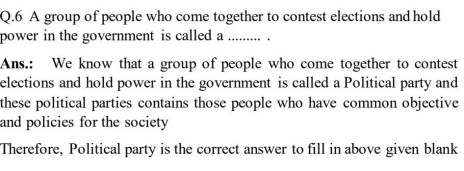Class 10 Social Science Chapter 4 – Gender, Religion and Caste Solutions | NCERT | CBSE Board (English Medium)
Class 10 Social Science Chapter 4 – Gender, Religion and Caste (NCERT Solutions for CBSE Board – English Medium)
This chapter from Democratic Politics – II (Political Science) discusses the social divisions in India based on gender, religion, and caste, and how these divisions present challenges to democracy. It examines issues of inequality and discrimination and highlights efforts to promote social justice and equality.
✅ What You Will Learn:
- The causes and consequences of social divisions in Indian society
- Gender inequality and efforts towards gender justice
- The role of religion and caste in social stratification
- Challenges that divisions pose to democracy and peace
- Measures to promote equality and social inclusion
🎯 Ospin Academy Advantages:
- Complete NCERT Solutions for Political Science Chapter 4 – Gender, Religion and Caste
- Prepared as per the latest CBSE syllabus
- Detailed answers for better understanding of social issues and democracy
- Inclusion of previous board examination questions and examples
- Facilitates critical thinking on social justice and equality
Class 10 Social Science (CBSE 2025) | English Medium Chapter-wise Solutions PDF
Board Exam Special!
(For CBSE Class 10, 2025)
Master Class 10 Social Science (English Medium) with this chapter‑wise solutions PDF.
Covers History, Geography, Civics & Economics as per latest NCERT syllabus.
Perfect for self-study, revision, and CBSE 2025 exam preparation.
Chapter 4 Political Parties
Q.1 State the various functions political parties perform in a democracy. Ans.: Some of the functions of political parties in a democracy are as follows:
a) Parties contest elections: In nearly every democratic country, the elections are mainly fought between the candidates who represent different political parties. In India, top party leaders choose candidates for contesting elections.
b) Different policies and programmes: There are a large number of opinions of different people and in a democracy large number of similar opinions has to be grouped together to provide a direction in which policies can be formulated by the government.
c) Parties make laws for the country: As we all know that all the laws that are formed are passed by the legislature but indirectly are formed by the political parties as most of the members belong to a particular party.
d) Parties form and run government: Political Parties after winning the elections by recruiting and training leaders form and run their government
e) Parties play the role of the opposition: Parties who fail to win in the elections play a role of opposition parties. They voice different views and criticize government for its failures or wrong policies.
Q.2 What are the various challenges faced by political parties?
Ans.: Challenges faced by the political parties are as follows:
a) There is a tendency in political parties towards concentration of power in one or a few leaders at the top. Ordinary members do not get sufficient information on what happens inside the party. Leaders make maximum decisions in the name of party. i.e. Lack of Internal Democracy is a big challenge faced by political parties.
b) There also have been dynastic successions in many political parties which often deprives the parties of appropriate leadership.
c) Most of the parties focused only on winning elections, they tend to use short-cuts to win elections. This hampers development and is against the spirit of democracy.
d) Due to lack of ideological differences between the political parties, many parties do not offer a meaningful choice to the voters.
Q.3 Suggest some reforms to strengthen parties so that they perform their functions well.
Ans.: Some of the reforms which can strengthen the political parties are as follows:
a) Parties should be asked to nominate women candidates for at least one third of the seats in the elections. This will also maintain gender equality in the society.
b) Regulation of internal affairs of various parties should be made necessary and a law should be made which will help in the regulation of internal affairs.
c) To eliminate lobbying and unfair competition for the funding a state funding shoul be formed for the elections. The government should also give parties money to support their election expenses.
d) A law should be established to regulate the internal affairs of parties, thereby making them more transparent.
Q.4 What is a political party?
Ans.: A political party is basically a group of people who have common objective of attaining power in the government by winning the elections. Political parties also contain those people who have common interest with similar policies and programmes. These political parties come together to form election and hold the power in the government elections. Political parties have their own ideology and vision for the society. On their various policies and programmes political parties work for the betterment of society
|
List I |
List II |
|---|---|
|
1. Congress Party |
A. National Democratic Alliance |
|
2. Bharatiya JanataParty |
B. State party |
|
3. Communist Party of India (Marxist) |
C. United Progressive Alliance |
|
4. Telugu Desam Party |
D. Left Front |

Q.7 Match List I (organizations and s truggles) with List II and select the correct answer sing the codes given below the lists:

A. 1-C, 2-A, 3-B, 4-D
B. 1-C, 2-D, 3-A, 4-B
C. 1-C, 2-A, 3-D, 4-B
D. 1-D, 2-C, 3-A, 4-B
Ans.: The correct match for the above given list are as follows: Congress Party : United Progressive Alliance
Bharatiya JanataParty : National Democratic Alliance
Communist Party of India (Marxist) : Left Front
Telugu Desam Party : State party
Therefore, option (c) is correct
Q.8 Who among the following is the founder of the Bahujan Samaj Party?
A. Kanshi Ram
B. Sahu Maharaj
C.B.R. Ambedkar
D. Jyotiba Phule
Ans.: BSP (Bahujan Samaj Party) is considered as the third largest party of our country. It was founded by Kanshi Ram in the year 1984
Hence, option (A) is correct.
Q.9 What is the guiding philosophy of the Bharatiya Janata Party? A. Bahujan Samaj
B. Revolutionary democracy
C. Integral humanism
D. Modernity
Ans.: The guiding philosophy of BJP is Modernity
Hence, option (D) is correct
Q.10 Consider the following statements an parties.
A) Political parties do not enjoy much trust among the people B) Parties are often rocked involving top party leaders
C) Parties are not necessary to run governments.
Which of the statements given above are correct?
A. A, B and C
B. A and B
C. B and C
D. A and C
Ans.: We know that in politics it is very difficult to believe on someone and because of it political parties do not enjoy much trust among the people also parties are often rocked involving top party leaders and political parties are very important or a democratic country to run the government
Therefore, statements A and B are correct while C is incorrect Hence, option (b) is correct.
Q.11 Read the following passage and answer the questions given below:
Muhammad Yunus is a famous economist of Bangladesh. He received several international honours for his efforts to promote economic and
social development for the benefit of the poor. He and the Grameen Bank started, jointly, received the Nobel Peace Prize for 2006, In February 2007, he decided to launch a political party and contest in the parliamentary elections. His objective was to foster proper leadership, good governance and build a new Bangladesh. He felt that only a political party different from the traditional ones would bring about new political culture. His party would from the grassroots level. The launching of the new party, called Nagarik Shakti (Citizens’ Power), has caused a stir among the Bangladeshis. While many welcomed his decisions, some did not like it. “Now I think Bangladesh will have a chance to choose between good and bad and .eventually have a good government,” said Shahedul Islam, a government official. “That government, we hope, would not only keep itself away from corruption but also make fighting corruption and black money a top priority.” But leaders of traditional political parties who dominated the country’s politics for decades were apprehensive. “There was no debate (over him) winning the Nobel, but politics is different-very challenging and often controversial,” said a senior leader of the Bangladesh Nationalist Party. Some others were highly critical. They asked why he was rushing into politics. “Is he being planted in politics by mentors from outside the country,” asked one political observer.
Do you think Yunus made a right decision to float a new political party?
Do you agree with the statements and fears expressed by various people? How do you want this new party organised to make it different from other parties? If you were the one to begin this political party how would you defend it?
Ans.: From the above given passage it seems very clear that Yunus made a right decision to launch a political party and contest in the parliamentary elections
Ye I agree with the statement and fears expressed by the people as it’s a human tendency when a competitor comes in front of anybody, people look for excuses. Also, when there are more than one parties in the country
people have a choice to choose their own leader. Last but not least it should be democratic from the grass root level
Class 10 Social Science Chapter 4 – Frequently Asked Questions
Get Free NCERT PDFs
If you want to download free PDFs of any chapter, click the link below and join our WhatsApp group:

